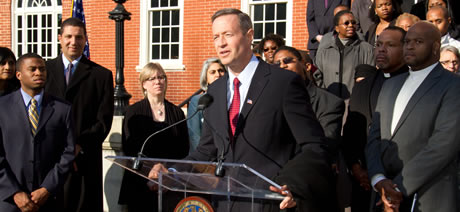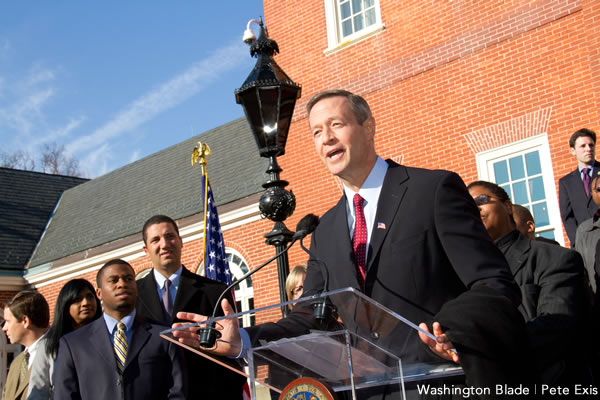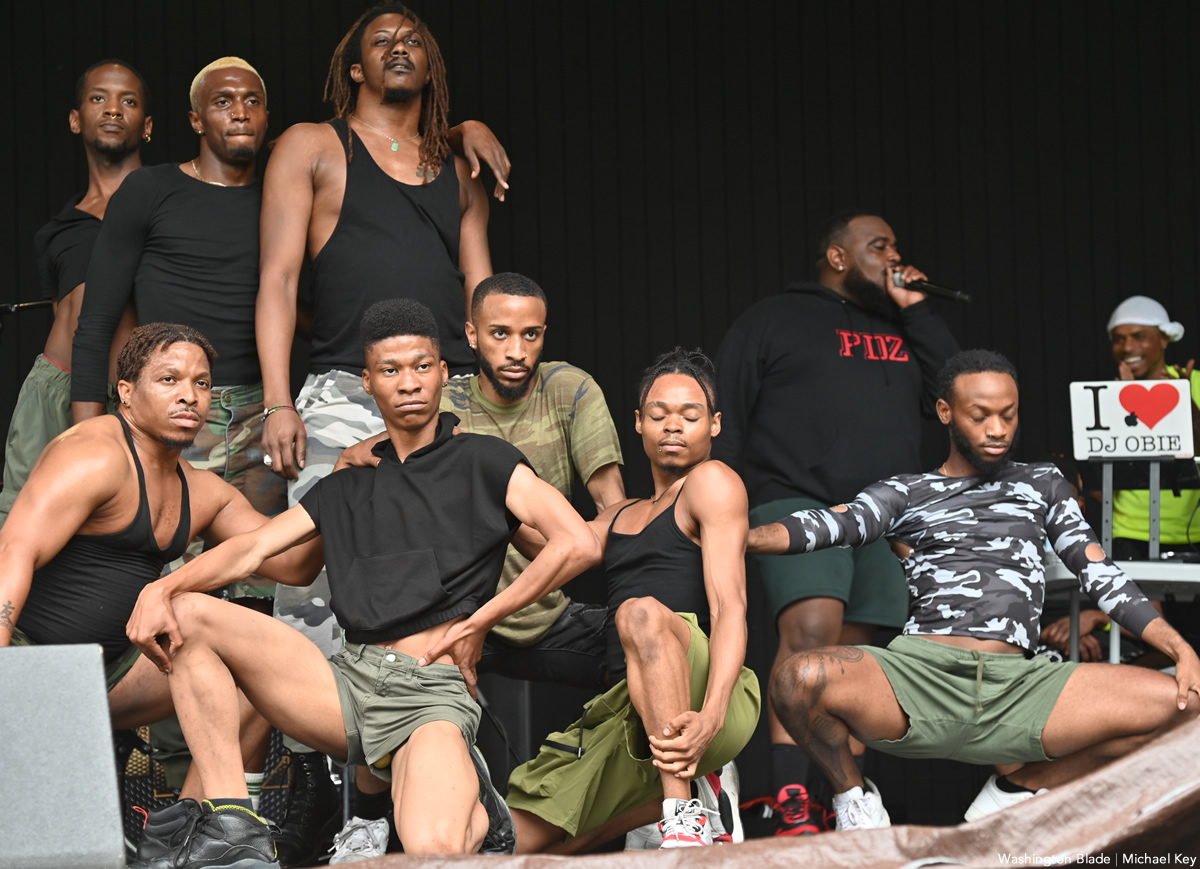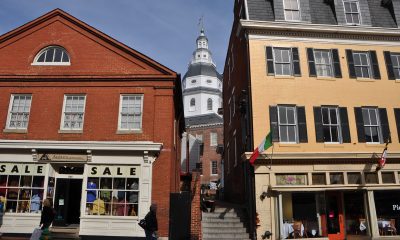Local
O’Malley says marriage bill brings dignity, religious freedom
LGBT advocates, clergy, labor leaders join governor in launching campaign to pass bill


Gov. Martin O’Malley on the steps of the governor’s residence in Annapolis, Maryland (Washington Blade photo by Pete Exis)
At a gathering on the steps of the governor’s residence in Annapolis, Maryland Gov. Martin O’Malley on Tuesday called on the state’s residents and lawmakers to join him in supporting his newly drafted same-sex marriage bill.
With about 50 supporters of the bill standing behind him, including same-sex couples, clergy members, and state labor leaders, O’Malley said the bill provides a proper balance between “equal protection under the law” and “religious freedom.”
His remarks came on the day after he officially introduced the Civil Marriage Protection Act into the Maryland General Assembly and minutes after he hosted a breakfast in the governor’s residence for representatives of the coalition of organizations and clergy backing the bill.
“There is a broad coalition, and many are arrayed on the steps here with me, and they are all supportive of the bill I introduced last night on civil marriage equality in the state of Maryland,” he said.
“All of us want the same thing for our children. Marylanders of different religious beliefs, Marylanders of all walks of life all want the same thing for our children. We want our children to live in loving, stable, committed households that are protected equally under the law,” he said.
Anticipating what political observers in the state capital expect to be an aggressive campaign to oppose the bill by religious groups, including leaders the Catholic Archdiocese of Maryland, O’Malley stressed that his bill provides expanded protections for religious institutions and people of faith.
“We also believe that we can protect religious freedom and rights equally under the law,” he said. “Other states have found a way to do this. We can find a way to do this too. And that common ground that allows us to move forward is dignity — the human dignity of every single person,” he said.
Among those who spoke at the gathering in addition to O’Malley were Rev. Starlene Joyner Burns, founder of a Christian ministry in Bowie, Md.; Ezekiel Jackson, an official with the Service Employees International Union Local 1199 of Maryland; and State Senator Rich Madaleno (D-Montgomery County, one of seven out gay members of the General Assembly.
Also speaking were O’Brian Banner, 28, and Daryl Fields, 27, who identified themselves as a gay couple from New Carrollton, Md., near D.C., who hope to marry in their home state.
“We’ve been together for five years,” Banner said. “We moved here two years ago from North Carolina with the hope of a better opportunity.”
Like most other couples, Banner said, he and his partner would like to realize “the American dream – to get married, adopt children, and own a home.”
Others attending the gathering included out gay House of Delegate members Luke Clippinger (D-Baltimore), Heather Mizeur (D-Montgomery County), Mary Washington (D-Baltimore), and Peter Murphy (D-Charles County).
Mizeur called O’Malley’s strong support for the same-sex marriage bill a “tremendous” development that would greatly increase the bill’s prospects for passing.
Also in attendance was Sister Jeannine Gramick, co-founder of the Mt. Rainier, Md., based New Ways Ministry, an LGBT supportive Catholic organization. Gramick said opposition to the same-sex marriage bill by Catholic Church officials in Maryland would be offset by support for same-sex marriage rights and LGBT equality by a “solid majority” of rank and file Catholics in Maryland.
“The momentum is growing and there’s a lot of hard work to do,” said O’Malley, in assessing the bill’s chances of passage in the legislature’s 90-day legislative session. “But we are going to be successful in this legislative session.”
Sultan Shakir, campaign manager for Marylanders for Marriage Equality, the coalition of LGBT, civil rights, labor, and religious groups leading the effort to pass the bill, said he expects both the State Senate and House of Delegates to vote on the bill before the end of February.
He noted the Senate Judicial Proceedings Committee is scheduled to hold a public hearing on the bill on Jan. 31. Shakir and Madaleno said the committee is expected to vote to send the bill to the full Senate shortly after the hearing and a Senate vote could take place within a week or two.
“We have the votes to pass it in the Senate,” said Madaleno.
Once cleared by the full Senate, which approved the bill last year, Shakir said it will go to the House of Delegates, which he expects to vote on the measure sometime before the end of February.
“All of us are engaging in on-the-ground efforts to move hearts on this issue and to generate votes when we get to the House of Delegates,” said Mizeur, one of the lead sponsors of the bill in the House.
“And we know it’s going to be a challenge again,” she said. “No one is taking this for granted. It’s not a done deal. But we definitely feel like it’s Maryland’s moment and we’re going to make this happen.”
The bill died in the House of Delegates last year when supporters determined they didn’t have the votes to pass it and voted to send it back to committee.
With O’Malley’s changes this year that he says have strengthened the bill’s “religious liberties” provisions, supporters say they are hopeful several House members who declined to support the measure last year will help to pass it this year.
When asked at the news conference what he sees as the main difference between last year’s bill and this year’s measure, O’Malley said, “The protections of religious liberty are more explicit in this bill.”
He added, “In fact, they may be more explicit in the bill than they had been in any other bills around the country. I know that our legislative team was drawing upon the experience in other states that have passed this measure and they found a way to protect rights equally while also protecting religious liberties.”
Sen. Jamie Raskin (D-Montgomery County), one of the lead sponsors of the bill, said he was studying the bill’s new wording when contacted by the Blade Tuesday afternoon.
Raskin, an American University law professor, said O’Malley’s version of the bill appears to have added to a provision he and members of the Senate Judicial Proceedings committee put in the bill last year in an effort to accommodate religious organizations and churches.
The provision allows organizations like the Catholic group Knights of Columbus to decline to provide public accommodations such as rental of a hall for a gay wedding, Raskin said.
“Arguably under current law the Knights of Columbus hall has to be open to everyone if it is a place of public accommodation,” he said. “So there was a small sacrifice in public accommodations law to bend over backwards to accommodate religiously oriented institutions. It has not gone much further than that.”
Raskin added, “We haven’t entered into an examination yet into what the governor’s bill means. But I don’t think it goes much further than that. And I think the marriage equality side can swallow our misgivings on that because we’re trading it for a long overdue vindication of everybody’s right to participate in institutional marriage.”
The anti-gay National Organization for Marriage, which lobbies against same-sex marriage laws throughout the country, has rejected the type of compromise language described by Raskin, saying same-sex marriage laws are unacceptable regardless of whether they include religious exemption provisions.
NOM President Brian Brown has said his organization works to defeat any lawmakers that vote for same-sex marriage because marriage must be “preserved” as a union only between a man and a woman.
District of Columbia
New D.C. LGBTQ+ bar Crush set to open April 19
An ‘all-inclusive entertainment haven,’ with dance floor, roof deck

D.C.’s newest LGBTQ+ bar called Crush is scheduled to open for business at 4 p.m. on Friday, April 19, in a spacious, two-story building with a dance floor and roof deck at 2007 14th St., N.W. in one of the city’s bustling nightlife areas.
A statement released by co-owners Stephen Rutgers and Mark Rutstein earlier this year says the new bar will provide an atmosphere that blends “nostalgia with contemporary nightlife” in a building that was home to a popular music store and radio supply shop.
Rutgers said the opening comes one day after Crush received final approval of its liquor license that was transferred from the Owl Room, a bar that operated in the same building before closing Dec. 31 of last year. The official opening also comes three days after Crush hosted a pre-opening reception for family, friends, and community members on Tuesday, April 16.
Among those attending, Rutgers said, were officials with several prominent local LGBTQ organizations, including officials with the DC Center for the LGBTQ Community, which is located across the street from Crush in the city’s Reeves Center municipal building. Also attending were Japer Bowles, director of the Mayor’s Office of LGBTQ Affairs, and Salah Czapary, director of the Mayor’s Office of Nightlife and Culture.
Rutgers said Crush plans to hold a grand opening event in a few weeks after he, Rutstein and the bar’s employees become settled into their newly opened operations.
“Step into a venue where inclusivity isn’t just a promise but a vibrant reality,” a statement posted on the Crush website says. “Imagine an all-inclusive entertainment haven where diversity isn’t just celebrated, it’s embraced as the very heartbeat of our venue,” the statement says. “Welcome to a place where love knows no bounds, and the only color or preference that matters is the vibrant tapestry of humanity itself. Welcome to Crush.”
The website says Crush will be open Tuesdays and Wednesdays from 4 p.m. to 12 a.m., Thursdays from 4 p.m. to 2 a.m., Fridays from 4 p.m. to 3 a.m., Saturdays from 2 p.m. to 3 a.m., and Sundays from 2 p.m. to 12 a.m. It will be closed on Mondays.
Crush is located less than two blocks from the U Street Metro station.
District of Columbia
Reenactment of first gay rights picket at White House draws interest of tourists
LGBTQ activists carry signs from historic 1965 protest

About 30 LGBTQ activists formed a circular picket line in front of the White House Wednesday afternoon, April 17, carrying signs calling for an end to discrimination against “homosexuals” in a reenactment of the first gay rights protest at the White House that took place 59 years earlier on April 17, 1965.
Crowds of tourists looked on with interest as the activists walked back and forth in silence in front of the White House fence on Pennsylvania Avenue. Like the 1965 event, several of the men were dressed in suits and ties and the women in dresses in keeping with a 1960s era dress code policy for protests of the Mattachine Society of Washington, D.C., the city’s first gay rights group that organized the 1965 event.
Wednesday’s reenactment was organized by D.C.’s Rainbow History Project, which made it clear that the event was not intended as a protest against President Joe Biden and his administration, which the group praised as a strong supporter of LGBTQ rights.
“I think this was an amazing event,” said Vincent Slatt, the Rainbow History Project official who led efforts to put on the event. “We had twice as many that we had hoped for that came today,” he said.
“It was so great to see a reenactment and so great to see how far we’ve come,” Slatt said. “And also, the acknowledgement of what else we still need to do.”
Slatt said participants in the event who were not carrying picket signs handed out literature explaining the purpose of the event.
A flier handed out by participants noted that among the demands of the protesters at the 1965 event were to end the ban on homosexuals from working in the federal government, an end to the ban on gays serving in the military, an end to the denial of security clearances for gays, and an end of the government’s refusal to meet with the LGBTQ community.
“The other thing that I think is really, really moving is some of the gay staff inside the White House found out this was happening and came out to greet us,” Slatt said. He noted that this highlighted how much has changed since 1965, when then President Lyndon Johnson’s White House refused to respond to a letter sent to Johnson from the Mattachine Society explaining its grievances.
“So now to have gay people in the White House coming out to give us their respects and to say hello was especially meaningful to us,” Slatt said. “That was not expected today.”
Among those walking the picket line was longtime D.C. LGBTQ rights advocate Paul Kuntzler, who is the only known surviving person who was among the White House picketers at the April 1965 event. Kuntzler said he proudly carried a newly printed version of the sign at Wednesday’s reenactment event that he carried during the 1965 protest. It stated, “Fifteen Million Homosexuals Protest Federal Treatment.”
Also participating in the event was Japer Bowles, director of D.C. Mayor Muriel Bowser’s Office of LGBTQ Affairs. Bowles presented Slatt with a proclamation issued by Bowser declaring April 17, 2024, Mattachine Society Day in Washington, D.C.
“Whereas, on April 17, 1965, the Mattachine Society of Washington courageously held the nation’s inaugural picket for gay rights, a seminal moment in the ongoing struggle for LGBTQIA+ equality in the United States, marking the genesis of public demonstrations advocating for those rights and paving the way for Pride Marches and Pride celebrations worldwide,” the proclamation states.
About 30 minutes after the reenactment event began, uniformed Secret Service agents informed Slatt that due to a security issue the picketers would have to move off the sidewalk in front of the White House and resume the picketing across the street on the sidewalk in front of Lafayette Park. When asked by the Washington Blade what the security issue was about, one of the Secret Service officers said he did not have any further details other than that his superiors informed him that the White House sidewalk would have to be temporarily cleared of all people.
Participants in the event quickly resumed their picket line on the sidewalk in front of Lafayette Park for another 30 minutes or so in keeping with the 1965 picketing event, which lasted for one hour, from 4:20 p.m. to 5:20 p.m., according to Rainbow History Project’s research into the 1965 event.
Although the LGBTQ picketers continued their procession in silence, a separate protest in Lafayette Park a short distance from the LGBTQ picketers included speakers shouting through amplified speakers. The protest was against the government of Saudi Arabia and organized by a Muslim group called Al Baqee Organization.
A statement released by the Rainbow History Project says the reenactment event, among other things, was a tribute to D.C.-area lesbian rights advocate Lilli Vincenz, who participated in the 1965 White House picketing, and D.C. gay rights pioneer Frank Kameny, who founded the Mattachine Society of Washington in the early 1960s and was the lead organizer of the 1965 White House protest. Kameny died in 2011 and Vincenz died in 2023.
The picket signs carried by participants in the reenactment event, which were reproduced from the 1965 event, had these messages:
• “DISCRIMINATION Against Homosexuals is as immoral as Discrimination Against Negroes and Jews;”
• “Government Should Combat Prejudice NOT PROMOTE IT”
• “White House Refuses Replies to Our Letters, AFRAID OF US?
• “HOMOSEXUALS Died for their Country, Too”
• “First Class Citizenship for HOMOSEXUALS”
• “Sexual Preference is Irrelevant to Employment”
• “Fifteen Million U.S. Homosexuals Protest Federal Treatment”
District of Columbia
Organizers announce details for D.C. Black Pride 2024
Most events to take place Memorial Day weekend at Westin Downtown

The Center for Black Equity, the organizer of D.C. Black Pride, the nation’s first and one of the largest annual African-American LGBTQ Pride celebrations, announced this year’s event will take place Memorial Day Weekend from May 24-27.
The announcement, released April 16, says that most 2024 D.C. Black Pride events will take place at the Westin Washington, D.C. Downtown Hotel at 999 9th St, N.W.
“With the theme Black Pride Forever, the event promises a weekend filled with vibrant celebrations, empowering workshops, and a deep exploration of Black LGBTQIA+ history and culture,” the announcement says.
It says events will include as in past years a “Rainbow Row” vendor expo at the hotel featuring “organizations and vendors created for and by the LGBTQIA+ community” offering products and services “that celebrate Black excellence.”
According to the announcement, other events include a Health and Wellness Festival that will offer workshops, demonstrations, and activities focused on “holistic well-being;” a Mary Bowman Poetry Slam “showcasing the power and beauty of spoken word by Black LGBTQIA+ artists;” the Black Pride Through the Decades Party, that will celebrate the “rich history of the Black LGBTQIA+ movement;” and an Empowerment Through Knowledge series of workshops that “delve into various topics relevant to the Black LGBTQIA+ community.”
Also, as in past years, this year’s D.C. Black Pride will feature its “Opening Night Extravaganza” reception and party that will include entertainment and live performances.
The announcement notes that D.C.’s annual Black Pride celebration, started in 1991 as a one-day outdoor event at Howard University’s Banneker Field, has inspired annual Black LGBTQ Pride events across the United States and in Canada, United Kingdom, Brazil, Africa, and the Caribbean. More than 300,000 people attend Black LGBTQ Pride events each year worldwide, the announcement says.
Full details, including the official schedule of events, can be accessed at dcblackpride.org.
-

 Africa4 days ago
Africa4 days agoCongolese lawmaker introduces anti-homosexuality bill
-

 District of Columbia21 hours ago
District of Columbia21 hours agoReenactment of first gay rights picket at White House draws interest of tourists
-

 World4 days ago
World4 days agoOut in the World: LGBTQ news from Europe and Asia
-

 Arizona1 day ago
Arizona1 day agoAriz. governor vetoes anti-transgender, Ten Commandments bill












